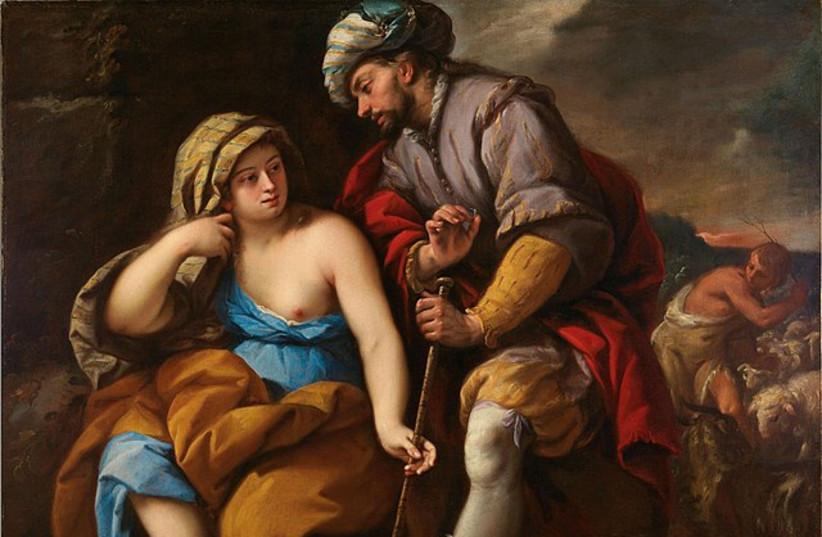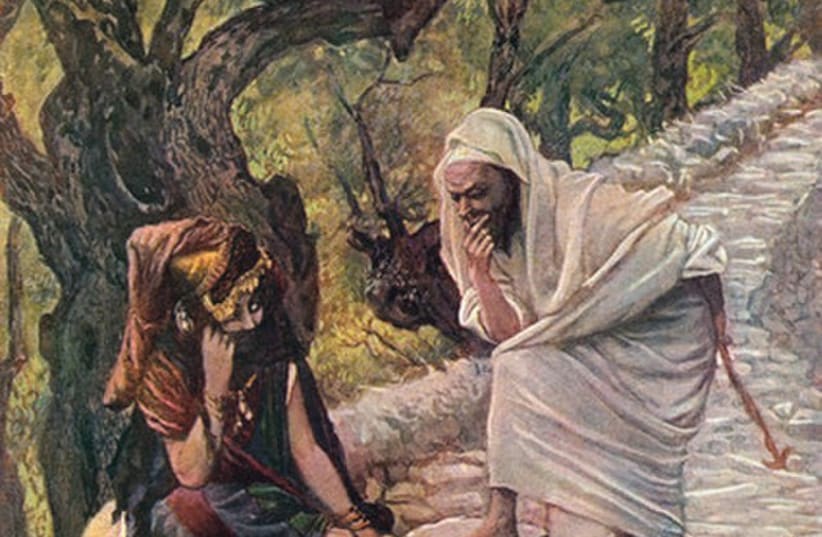In today’s cancel culture, we could easily see Tamar publicly denounce Judah, as she did near the end of this week’s portion Vayeshev. Tamar had clear grounds, particularly as her life was on the line. However, she chose not to. Why? To answer that question, we need to unravel one of the most compelling stories in the Bible.
Chapter 38 of Genesis, which comprises the story of Tamar and Judah, is nestled at the beginning of the Joseph cycle. That cycle begins in the previous chapter of Genesis, opening our parasha, and continues through chapter 50, the last chapter of Genesis. The Torah commentary Etz Hayim tells us the placement of this chapter “alludes to the future Joseph-Judah polarity in the history of the Jewish people,” as they ascend to greater positions of leadership than Reuven, the firstborn. Related, Joseph represents the northern kingdom, and Judah represents the southern kingdom. For our concerns, Tamar is the role model to learn from.
She enters the story as the wife of Er, the first son of Judah, and his unnamed wife. Er dies, and following the custom of Levirate marriage – whereby a widow marries her brother-in-law so that his dead brother’s lineage will continue – Tamar marries Onan. Onan also dies and Tamar is prepared to marry the remaining brother, Shelah.
Judah, however, is worried that Tamar is tainted goods, even though, according to the text, they, not Tamar, each did something “displeasing to the Lord” (Genesis 38: 7, 10). Judah tells Tamar to wait for Shelah to grow up.
After “a long time” (Genesis 38:12), Tamar realizes Judah, who himself is now a widower, had been stalling. Taking matters into her own hands, dressing as a face covered harlot, she stationed herself where Judah would find her. Her plan worked: They had sexual relations and she became pregnant.


Some three months later, when it became apparent Tamar was pregnant, she was brought before Judah, charged with being a harlot and was immediately sentenced to death by immolation. Rather than publicly call out Judah, Tamar quietly sent a message to him, with personal items he had left as a pledge for payment, saying, “I am with child by the man to whom these belong” (Genesis 38:25).
Immediately Judah recognized them. At that moment, he could have had the death sentence carried out, avoiding the embarrassment of the truth emerging. Instead, he says, “She is in the right more than I, inasmuch as I did not give her to my son Shelah.” Tamar is spared, six months later giving birth to twins, Perez and Zerah. According to Jewish tradition, the Messiah will be a descendant of Perez.
This extraordinary story raises many questions. Why did Tamar go to such great lengths to honor the requirements of Levirate marriage? Why did she not publicly defend herself? Why did Judah spare her? Why is the Messiah a descendant from such a union?
BEFORE WE answer, we need to recognize that many dynamics of this story fall into tropes that degrade women. Tamar’s identity and power come through sex, and she employs deceit. She operates in a world defined by laws written and enforced by men. These dynamics must be acknowledged not only as existing during her lifetime, but in too many ways today as well.
Tamar is trapped in a patriarchal world. However, even within that context we see Tamar’s agency. Though her father-in-law Judah does not follow the law, she remains incredibly loyal to her deceased husband, being patient and tenacious. Tamar also brilliantly thinks forward; like a chess player anticipating moves ahead, she asks Judah for his seal, cord, and staff to later save her life.
She decides to preserve Judah’s dignity and allow him to save face when she does not openly present the evidence even in the face of her own death. While mistreated, she will not mistreat others. She models an inner strength of compassion and virtue.
Is this the moment when Judah learns to live up to his name? The 12 tribes of Israel will emerge from Jacob’s four wives/concubines. When Judah is born, he is the fourth child of Leah, and she realizes that more tribes will come from her. In recognition, she “declared, ‘This time I will praise/odeh the Lord.’ Therefore, she named him Judah/Yehudah” (Genesis 29:35). That is to say, the core of what it means to be Judah, and by extension Jewish, is to live in a state of thanks. The Talmud reminds us to say a minimum of 100 blessings every day (Menachot 43b).
When we count our blessings, appreciating our life, focusing on what we have, we are able to store, if you will, positive credit. Ideally, we can draw on it during difficult moments in our lives. Judah, “the one who lives in a state of thanks,” was able to do so when Tamar confronted him with an embarrassing truth. In that incident, Judah becomes a model for us as well.
Finally, we need to ask why the Messiah has such a messy pedigree. Perhaps the answer lies in the question itself. According to many, the messianic age will only follow difficult times (Sotah 9:15). It is a powerful message of hope when the world appears hopeless. This genealogical chapter of the Messiah also reminds us not to be so judgmental of others.
More than any lesson of this remarkable chapter of the Bible, though, it is Tamar – who stands out with her steadfastness, poise, ingenuity and empathy – who makes herself worthy of being a foremother of the Messiah.
The writer is rabbi emeritus of the Israel Congregation, Manchester Center, Vermont, and a faculty member of the Arava Institute for Environmental Studies and Bennington College.
